Summer 2015
Inside this issue
This summer, read all about the scintillating launch of the first fully open access university press in the UK, discover insights into UCL's early champions for the creation of the NHS and see how the Library's Strategy on Outreach is making a real difference to sixth form students in London. And we have packed lots of news on our Special Collections, in print and online, spanning from the Neolithic Age in the Orkneys to Jewish collections on show in London and in Barcelona, with a special feature about some beautiful and humorous digital exhibitions created by UCL BASc students as part of their course. We also feature the latest exhibition from our Queen Square Library and a new training facility in our Joint Library of Ophthalmology.
Ben Meunier, Assistant Director, Public Services
Featured
ReadingLists @ UCL Summer Sessions
Over the summer our TLSS team will be happy to set up reading lists for new courses and to show new academics how to use these, as well as running refresher sessions. Our blog and poster have more information or you can email us for further information or to book a session.
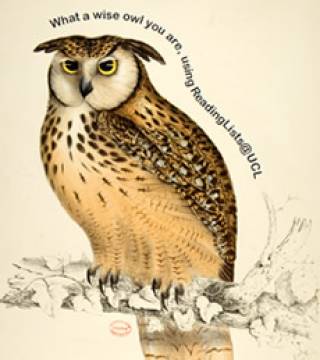
From the Director's Chair
Glittering launch of UCL Press
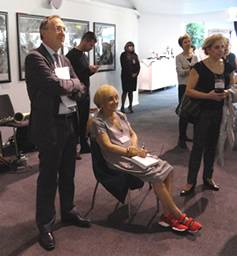
UCL Press was launched with a fanfare and a blaze of publicity on 4 June 2015. 150 people attended a gala event to inaugurate the Press on a beautiful early Summer's evening. The re-launch of UCL Press is historic because UCL Press is now the UK's first fully Open Access University Press. Our guest of honour was Professor Lisa Jardine, whose book Temptation in the Archives: Essays in Golden Age Dutch Culture is the first book to be published by UCL Press as an Open Access output.
UCL's Provost and President, Professor Michael Arthur, formally launched the Press in his inaugural address. Professor Arthur tied the birth of the Press to an important development in the UCL 2034 strategy - the Connected Curriculum. The Connected Curriculum will deliver a cutting-edge research-based education to UCL students. The Press, through its publication of new publishing formats such as the short form monograph, will provide an outlet for research-based pieces which will make UCL's research available to students and to the general public.
Professor David Price, Vice Provost (Research), has led the UCL Press Board which oversees the strategic development of UCL's publishing activity. He gave praise to the UCL Press team who had worked to make the evening and the re-birth of the Press such a success.
The key speaker of the evening was Professor Lisa Jardine herself. Professor Jardine has recently been made a Fellow of the Royal Society and she gave a passionate and inspiring homily on the reasons why she had published in Open Access, and therefore why she had chosen UCL Press as her publisher. Professor Jardine underlined that Open Access was a ground-breaking development in the world of scholarship, which loosed the chains from the authors and their works which were hidden behind a paywall. In this, Professor Jardine echoed the words of Professor Michael Arthur, who saw UCL and its Press as a European leader of anarchic and much-needed change.
Alongside Professor Jardine's book, two other authors were published on 4 June. Gill Furlong (UCL Library Services) has produced the definitive volume Treasures from UCL, bringing into print decades of experience in UCL Special Collections. Alice Stevenson from the Petrie Museum published The Petrie Museum of Egyptian Archaeology: Characters and Collections, celebrating 100 years since the Petrie Museum first opened.
Open Access is absolutely core to the UCL Press mission. In this, as a department of UCL Library Services, its launch magnificently fulfils one of the key objectives of the Library Strategy, which aims to ensure that UCL Press becomes embedded into UCL.
The success of the new UCL publishing model is already becoming apparent. The three books launched on 4 June had been Open Access in UCL Discovery for just one week. Immediately after the launch, these three books had been downloaded 2,126 times from a staggering 60 countries around the world - all in the first week. It is a fantastic indication of future activity.
UCL Press is the first fully Open Access University Press in the UK. It marks UCL as a leader in innovation in the dissemination of scholarly outputs and flies the flag for the power for good that UCL brings to its mission and vision.
The Hague Declaration and European copyright reform
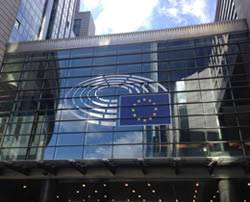
The European Commission is planning to reform European copyright law to make it fit for the digital age. On 6 May, the Commission launched its strategy for a Digital Single Market for Europe, which contains 16 initiatives to lay the foundations of Europe's digital future. Copyright reform figures as one of the actions the Commission will pursue. We now await the Commission's blueprint for copyright reform, which will be published in September.
I was in Brussels on 6 May and this was an exciting day to be there. In the morning, I gave a short presentation on copyright reform to a Breakfast Meeting of MEPs in the European Parliament building. The Parliament will have to approve any legislative changes introduced by the Commission. Present at the Breakfast Meeting was Julia Reda MEP, who was named rapporteur of the Parliament's review of the 2001 Copyright Directive. Her draft report recommended the EU-wide harmonisation of copyright Exceptions, a reduction in term length, broad Exceptions for educational purposes and a strengthening of the authors' negotiating position in relation to publishers, among other measures.
On the afternoon of 6 May, I chaired the launch of the Hague Declaration, which is concerned with copyright reform and the role of copyright in the digital age. I had previously led the drafting of the Declaration in a Workshop with stakeholders in The Hague before Christmas. 6 May finally saw the launch of the Declaration in Brussels in the offices of Science Europe. Again, Julia Reda was one of the attenders at the launch.
The Hague Declaration aims to foster agreement about how best to enable access to facts, data and ideas for knowledge discovery in the Digital Age. By removing barriers to accessing and analysing the wealth of data produced by Society, we can find answers to great challenges such as climate change, depleting natural resources, and globalisation. Key to this is the principle that intellectual property was not designed to regulate the free flow of facts, data and ideas, but has as a key objective the promotion of research activity. Where copyright frameworks do not currently support such a vision, legislators should immediately work to support the introduction of changes which would allow users to undertake content mining on materials to which they have lawful access. This, in a nutshell, supports the attempts of bodies like UCL and LERU (League of European Research Universities) to achieve copyright reform in Europe.
LIBER (Association of European Research Libraries) is campaigning for a mandatory pan-European Exception in European copyright frameworks, which cannot be overridden by contract, to allow researchers to undertake Text and Data Mining/Content Mining on materials to which they have lawful access. Text and Data Mining is a process which allows researchers to use automated means and tools to search, explore and create linkages between huge amounts of digital information.
Since its launch on 6 May, 490 institutions and individuals have signed the Declaration. Meanwhile, work on copyright reform in Europe continues. Lobbying of MEPs is continuing until the Summer recess at the end of July. Then, the Commission will issue its reform proposals in September. For these to pass into law, there has to be agreement between the Commission, the European Parliament and the Council of Ministers. It is a lengthy process. But the cause is good - reformulating copyright frameworks at a European level to make them fit for the digital age.
by Paul Ayris Director of UCL Library Services, UCL Copyright Officer & CEO of UCL Press
UCL Special Collections Connections
BASc Students Create Virtual Exhibitions from Special Collections Treasures
On 27 March, ten brave and extremely competent second-year undergraduates spent the day giving presentations on ten treasures from UCL Special Collections and Records Office: brave because not only were they presenting their proposals for exhibiting some of our most well-known and celebrated rare books, manuscripts and archival items, but their presentations were also their exams.
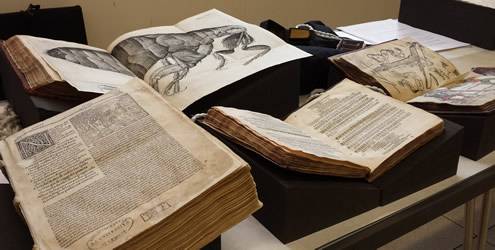
The day formed the culmination of the 'Object Lessons' module in UCL's ground-breaking Arts and Sciences (BASc) degree programme. Bringing a very wide range of science, social science, humanities and arts backgrounds to the course, the students were each allocated an item to study, a member of Special Collections or Records Office staff of whom to ask questions, and an initial task of researching and writing a report about an item for which most had very little prior knowledge. They were of course supported by a wonderful team of academic staff and a programme of lectures and seminars on the many ways to approach studying physical primary sources.
Each student was then put into a group alongside five others working on objects from other UCL collections. The groups had just a few weeks to decide on a target audience, come up with a theme that united all six apparently unconnected objects, and put together an engaging and informative digital exhibition.
The results were challenging, beautiful, humorous, topical, interactive, and creative. Students recorded their own Elizabethan soundtrack to a film of a C16th book, created fun quizzes for teenagers, and recorded journalistic interviews on religious and ethical issues raised by items such as a necklace made of human hair, a beautiful early Hebrew religious text, the notorious Brown Dog Affair, and a typescript for a BBC documentary on diving and submarine experiments held on humans during World War II. Some of the online exhibitions, we were convinced, would have given stiff competition to professionally produced digital resources on archives and rare books, materials that are notoriously difficult to present satisfactorily through digital images alone.
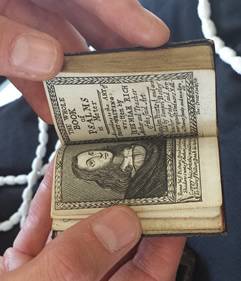
Special Collections' involvement forms part of our work to support UCL's Connected Curriculum initiative. One of the aims of the initiative is to introduce taught-course students to research-based learning before they reach the stage of applying for PhD or other professional research work. We have collaborated with History, Geography, History of Art, and other departments to give students the basic skills required to use Special Collections materials, and to try to convey a sense of the excitement of using our collections to develop fruitful and appropriate research questions. The BASc students were taught how to handle early books, parchment and archival items, how to harvest information about provenance and collectors from Library Services' professional catalogue records, how to manage copyright issues and write accurate captions and credit statements for exhibition items, and how to think creatively about using digital tools to present photographic surrogates of physical books and archives.
There is however also a selfish reason for our involvement in this sort of training. With the increase in digital surrogates of Special Collections available online comes an increase in requests to consult the physical originals, all the more so now that increased numbers of academic staff are approaching us from all disciplines to support their public engagement activities. Many of these enquiries come from early-career academics who have never before used a special collections library, so a lot of staff input is required from us to support them. We hope that projects such as the BASc module will produce a new generation for the future who are already trained in the basic skills needed to use our material safely and efficiently, whether they go on to work towards PhDs in the history of the book, become scientists needing to use our collections for films or documentaries, or pursue careers as exhibition installers, film researchers, publishers, journalists, conservators, or - you never know - librarians and archivists.
The final challenge for each BASc team was to arrive at a consensus on whether they would like their wonderful online exhibitions to be made public. Navigating the variety of creative-commons licences available was also one of the skills tackled by the students, being key to the development of successful digital resources. Once the students have made those decisions, we shall circulate details of any resources they have decided to share.
Special Collections Calendar
Exhibitions
- Octagon Gallery until 30 June 2015: Eights in the Octagon: Medieval and Renaissance Perspectives. Curated by academic staff from SELCS, History, History of Art, and Science and Technology Studies departments, in conjunction with Special Collections and Museums staff.
- Octagon Gallery, July 2015-January 2016: Fabrication: Dangerous Substances. Curated by academic staff from Art History, Science and Technology Studies, and Safety Services Departments, and from the Institute Of Making, Slade and Bartlett, in conjunction with Special Collections and Museums staff.
- Main Library until January 2016: Queen of the Sciences: A Celebration of Numbers and the London Mathematical Society celebrating the society's 150th anniversary. Curated by librarians in the Main Library Exhibition Group in conjunction with Special Collections staff.
- Museu d'Historia de Barcelona until 5 July 2015: The Jewish Bloom in Gothic Barcelona. Haggadah lent from Special Collections' Mocatta Collection, alongside items from the British Library, Cambridge and John Rylands University Libraries.
- Grant Museum until 27 June: Strange Creatures: The Art of Unknown Animals. Captain Cook's navigation manual lent from Special Collections' manuscripts, alongside items from Royal Museums Greenwich. Curated by academic staff from History and History of Art departments among others.
- Senate House Library, 22 June-18 September: London: Power, Progress and Pleasure. Curated by libraries and archives staff from UCL Special Collections, Senate House and LSE Libraries.
Events
- Special Collections' annual Treasures Day was held on 18 May, presenting items from the archives, medieval manuscripts, rare-books, medieval music fragments, Bentham, Jewish Pamphlets, London History, Huguenot, and Poetry Store and Alternative Magazines collections, alongside live conservation demonstrations and digital displays. Over a hundred students, staff and members of the public attended.
Special Collections material and digital resources were presented to and discussed by staff, students and the public at
- an evening celebrating the current Jewish Pamphlets cataloguing project
- Festival Of The Arts events on the current Eights in the Octagon exhibition and on the digital presentation of medieval manuscripts
- the Thinking Chinese conference
- a lecture hosted by Special Collections on the history of stationery bindings
Material will be presented at
- the annual conference of the Association of European Research Libraries (LIBER)
- and was presented at the launch of UCL Press
- Special Collections worked with the BBC and the Open University in the making of a documentary on Ada Lovelace, presented by the Bartlett's Hannah Fry, and the Bentham Project's Tim Causer appeared on BBC2's Coast Australia talking about work supported by Bentham Archive papers he has recently transcribed.
by Tabitha Tuckett, Rare-Books Librarian
Anglo-Jews, Christian Zionists and more
On Thursday 14th May we held an event showcasing some items from the Uncovering UCL's Jewish Pamphlet Collections project. It proved so popular that we had to move to a larger room! Some 40 UCL staff, students and members of the public came out in the pouring rain to hear about the project and view items from the collection.
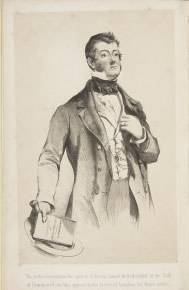
'The Author listening to the speech of Baron Lionel de Rothschild …'. Frontispiece of Advocacy of Jewish freedom / by "William Thornborrow". London, 1848.
The evening began with a brief introduction to UCL's Jewish collections and the Jewish Pamphlet Project from me as Hebrew & Jewish Studies Librarian, followed by a talk from Professor Colin Shindler of SOAS, University of London. Professor Shindler spoke warmly about the work of librarians in curating collections such as the Jewish pamphlets, and their invaluable role in making them accessible to world scholarship. He also highlighted the significance and breadth of the collection on show.
The project cataloguers, Dalia Maoz-Michaels and Peter Salinger, then presented the items on display, which fell into five categories:
- Jewish and Christian Precursors of Zionism - a selection of nineteenth century pamphlets advocating the return of the Jewish people to the Land of Israel, from widely differing perspectives, including both Christian evangelists and Jews
- Celebratory Poems - an eighteenth century Italian Hebrew wedding poem, and poems in honour of Sir Moses Montefiore (1784-1885)
- Liturgy and Thanksgiving Services - patriotic forms of prayer used by Anglo-Jewish congregations on occasions such as royal visits, royal births, and military campaigns
- Naturalisation and Political Emancipation - pamphlets reflecting the controversies surrounding the 'Jewish Naturalization Act' of 1753 and the many attempts in Parliament in the mid 19th century to remove Jewish civil disabilities
- Missionaries, Philo-Semites & Anti-Semites - pamphlets demonstrating the varied interactions between Jews and Christians during the 19th century, such as polemics between missionaries and Jews, and the writings of both philo- and anti-semites.
The audience then had the opportunity to look closely at the pamphlets and chat to staff involved in their cataloguing and conservation.
by Vanessa Freedman - Subject Librarian: Hebrew & Jewish Studies
Gordon Childe's Skara Brae Notebooks: Digitisation Project
UCL Library Services has been working with the UCL Institute of Archaeology to conserve and digitise the Skara Brae excavation notebooks. Funding was provided by Historic Scotland as part of their Skara Brae Project launched in 2015. The Project will bring together past and current research on the site and is designed to grow and develop as new research is completed. Skara Brae Neolithic village, located on the Orkneys, is of international archaeological importance and has been on the UNESCO World Heritage List since 1999.
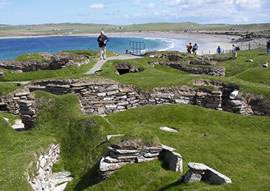
The three Skara Brae excavation notebooks (notebooks 58, 63 and 64) relate to Gordon Childe's excavations at the site in 1928-1930. Vere Gordon Childe (1892-1957) is widely regarded as the most distinguished European Prehistorian of his day. He was Abercromby Professor of Prehistoric Archaeology at the University of Edinburgh (1927-1946) and Director of the Institute of Archaeology, University of London (1946-1956). His life and writings continue to fascinate and inspire archaeologists today. Childe's academic papers and notebooks form the Childe Archive, part of the Institute of Archaeology archives, which are held in UCL Special Collections.
Skara Brae is Europe's best-preserved Neolithic village and is around 5000 years old. The ancient stone buildings of the semi-subterranean village are wonderfully preserved. Excavations at the site by Childe and others have uncovered a rich array of stone furniture, artefacts - including pottery, jewellery and carved stone objects - and organic remains, attesting to the sophisticated lives of the village's inhabitants. Photographs of the site, including some of Childe's excavations, are available through Canmore, Scotland's National Collection of buildings, archaeology and industry.
The digitised notebooks are now available through UCL Library Services Digital Collections.
by Katie Meheux, Librarian, Institute of Archaeology
Queen Square Archives Exhibition
Queen Square - a journey through its buildings & institutions
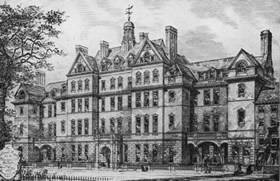
This exhibition, which will run in Queen Square Library, 23 Queen Square until August 2015, features artwork, photographs, plaques, plans and maps from Queen Square Archives, reflecting the Square's history from the early 18th century to the present day.
It includes artwork of the Square in early 1700/1800s, framed plans from the early days of the National Hospital and drawings of William Morris' house in the Square during the 1860s, photographs of the impact of two World Wars, and the opening of Queen Square House in the 1970s, and the Leonard Wolfson Experimental Neurology Centre in 2013.
A compilation of selected images is available online. Please see the exhibition handout for further information.
Visiting
You can visit to see our displays in person:
Monday - Friday 09:00-19:00 (last entry 18:00).
Please see our opening hours page for details of our opening over the coming weeks.
by Sarah Lawson
New Training Room in UCL Joint Library of Ophthalmology
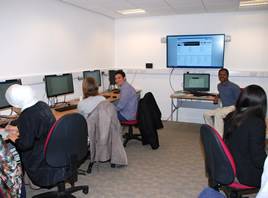
We have recently set up a fully functional air conditioned training room at the UCL Joint Library of Ophthalmology, with eleven computers and a wall mounted projector and sound system. We use the room to deliver group training sessions to our local library users and doctoral programme students from other campuses of UCL. The room is also used by the staff members of the Library, UCL Institute of Ophthalmology, Moorfields Alumni Association and by students for meetings, presentations, group discussions, examinations and interviews.
The space which the training room now occupies was previously a poorly lit, dull and unappealing basement storage area holding donated library materials in a number of rolling stacks. Over the course of five years, money allocated from the annual library budget and funding from other sources was used to develop the full potential of this space by redesigning the room adding power sockets and data points, improving the lighting and installing ventilation. It has been transformed into a fully functioning training room which will be an asset to our Library members.
by Joint Library of Ophthalmology Team
Sir Stewart and one of the Five Giant Evils
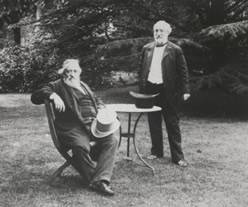
In 1842 Edwin Chadwick, after whom the Chadwick Building in the UCL Quad is named, became the first person to propose the creation of a national public health authority in England. He really could be said to have been 100 years ahead of his time.
It was in December 1942 that the Social Insurance and Allied Services Report, prepared by a committee chaired by William Beveridge, identified what it called five giant evils in society: Squalor, Ignorance, Want, Idleness, Disease. In that same month Sir William Stewart Duke-Elder, Ophthalmological Surgeon to St. George's Hospital, Tooting and Fellow of UCL, published A British Academy of Medicine in The Lancet. Here are some quotes from his article:
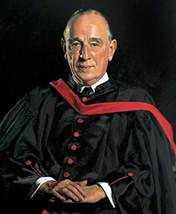
"More than one body has formulated plans for state-aided treatment of the sick, and one ministry has recently felt the need for professional guidance, but medicine, interpreted in its wide sense as social biology, should have a wider and higher mission - the creation of an environment wherein the fullest attainment of the health, happiness and efficiency of the people is possible."
"After the war the state must play a much larger part in administering medicine than hitherto, and if a living science is not to be deadened by bureaucracy medicine must be able to advise the state with a single authoritative voice …"
"… it is of primary importance that some professional body of recognised authority and influence should be created, not displacing or destroying, but coordinating and augmenting the influence of the present unrelated and relatively impotent bodies …"
"This scheme admittedly cuts across many long-established interests and will be unrealisable unless whole-hearted effort is made, but by some such plan British medicine can be made a new and living organism of incalculable value to the people and so to the state; while fostering international relationships and aiding humanity at large it could play no small part in moulding a more rational and stable world society."
In 1946, The National Health Service Act created the National Health Service for England and Wales and the following year a similar Act was set up for Scotland. Duke-Elder may not have been involved in the creation of the Health Service himself but he certainly helped to set its agenda. His focus at the time was on the Institute of Ophthalmology, which he founded and which was officially opened in November 1948 to provide a research resource for Moorfields Eye Hospital. The Institute merged with UCL in 1995.
by Bill Lehm
Twyford High School & UCL Libraries
UCL 2034 declares that "we will work closely with schools in London, and elsewhere in the UK, to help raise aspirations and to identify individuals in target groups that might come to UCL." The UCL Library Services Strategy echoes this commitment as part of our Communication, Outreach and Open Access KPA. This case study from a member of staff at Twyford High School illustrates the kind of impact which UCL Library Services has had on a group of London-based sixth form students. Access was arranged by the Library Membership Team.
For a number of summers, Twyford High School sixth form students have used, enjoyed and gained immeasurably from a UCL library ticket! We've been incredibly fortunate to receive these tickets and value this connection between UCL and the school. Students gain in confidence and in skills and this, in turn, has contributed to our university entrance success.
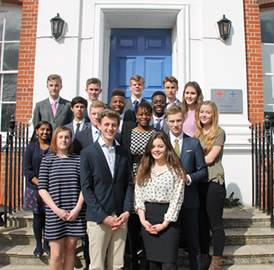
Twyford is a large, west London comprehensive with an oversubscribed sixth form of some 500+ students. My role, as part of the sixth form team, includes supervising some of our many EPQ students and preparing others for university entrance. Our onsite resources are limited as a consequence of the inevitable funding issues most schools are now facing. Students' own access to resources are limited and online journals are costly. As we all know, university entrance expectations focus not only on grades, but also require that students demonstrate learning, reading and academic curiosity beyond the A level curriculum. Further feedback also suggests that undergraduates, in general, begin their first year uncertain of how to use resources as independent learners.
In meeting these expectations, the Twyford EPQ programme taught element includes the development of research skills. Students also attend subject taster days, master classes and lectures with some students also taking up the UCL Summer Challenge. The UCL library ticket is a huge bonus at the end of Year 12, with those receiving a ticket making the most of the long summer holiday in accessing the library and database. The impact on student work is considerable, with their research tuition being put into practise using the wonderful UCL library resources. Close text reading, note taking and evaluation of resources is developed alongside learning how to use material in the final long essay. All students have mentioned the challenge of working with material beyond their current learning level and the impact this has on their work. Without exception, every student notes as one of their significant outcomes, that they feel they have bridged sixth form and undergraduate study. Lauren, one of our current year 12 students aiming for medicine, entered a Cambridge 5000 word science prize essay competition, completing this alongside her AS studies. The necessary research, reading, long essay writing skills were built almost from scratch and key to all of this was the UCL library ticket. Lauren now has a folder of notes, resources and a second prize award! She is thrilled and the impact on her university application and studies will be considerable, not least as an independent learner.
by Carmela Hinckley, Teacher at Twyford High School via Magali Perrey, Library Information Point Officer
 Close
Close

